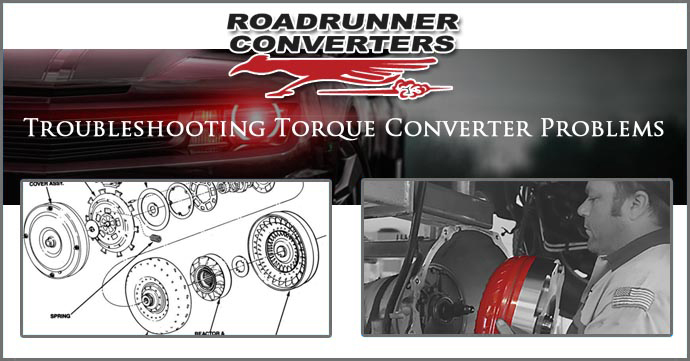If you are troubleshooting an old torque converter there are a lot of different problems you could be experiencing. We have complied this list of how to troubleshoot problems with your old torque converter so you can figure out if it needs to be fixed, or if you need a replacement torque converter.
Signs, Causes, & Replacement
Your torque converter is a part of your vehicle that will handle just how much fluid is sent to your automatic transmission and allows the engine to keep running while it is stopped. This part is really vital and if it happens to malfunction then it may cause weird behavior like slipping and shuddering. The hard part is diagnosing the cause of the torque converter issue. There are a lot of reasons that may be causing the issue and the torque converter may not be the problem. Today, we are going to cover the common issues and the causes.
Signs of Torque Converter Issues
It may be hard to find a transmission issue like a problem with a torque converter, but there are some signs that you need to be aware of. Signs of bad torque converters are slipping, dirty fluid, strange noises, overheating, shuddering, or high stall speeds. On many occasions your torque converter may not be the cause of the issue, so don’t rush to a conclusion until you have your transmission checked out.
Overheating: If you happen to notice your temperature gauge and it is overheating, this could be your torque converter having issues. Overheating is a common sign of issues, because a drop in fluid pressure will cause the transmission to overheat. It also be a sign of solenoid issues or low fluid levels, so check those first.
Slipping transmission: A issue the torque converter will show quickly, as the fluid can’t be managed right. If too much or not enough fluid is passed to the transmission, it can cause the gears to slip and you will feel a loss of acceleration. You may even notice a drop in the gas mileage. Ineffective or low fluid can also be the cause, so check your fluids first if you notice slipping.
Shuddering: If you begin to feel shuddering when going under 45 MPH, then this could be that your torque converter is having issues. It will feel like you are running over bumps or rough road and you will notice when it happens. Shuddering will come and go without a warning, so once you feel it, get your transmission checked out. Don’t wait for it happen to you again.
Fluid Contaminants: If you check your fluid and you see a lot of black materials, it could mean that your torque converter or transmission clutches are damaged. You need to perform a fluid change first and then run your car for a bit and then check it again.
Increased Stall Speeds: A bad torque converter will cause your transmission to take longer to engage the engine which causes a higher than normal stall speed. You may do a stall speed test to find any torque converter issues, but you will need to know your stall speed and torque converter specifications first.
Strange Sounds: If you are hearing revving noises or clicking it could mean that you have a bad torque converter.
How to test for Torque Converter Issues
This is a simple test that may help to find any issues with your torque converter. What you will need to do is start the car in the driver’s seat and let is idle for a few minutes. Then step on the gas lightly a couple of times, then let it idle and press on the brake and shift into drive. During this time, you will want to listen for strange noises like revving or clicking or if you notice any shuddering. If not, shift through each gear including reverse and notice for any of the signs that are listed above. Finally, drive your car and look for the same signs as well as slipping or shuddering.
Common Causes for Torque Converter Issues
There are a few reasons why this could happen. Don’t just assume what the issue is until the transmission is looked at, but below are some ideas about what it could be.
Damaged Torque Converter Seals: Having damaged torque converter seals will let fluid leak out of the converter and cause issues like slipping, shifting issues, and overheating. The seal will need to be found and replaced.
Damaged needle bearings: this is a very common issue and the needle bearings are what will separate the turbine, converter housing, stator and impeller. If they get damaged, it will cause the transmission to make weird noises when driving. This is because there is metal to metal contact between the converter parts, which causes metal chips that the transmission fluid picks up and puts into the transmission.
Damaged torque converter clutches: Just like a manual transmission, automatics will have clutches but they are located within the transmission as well as within the torque converter assembly. They will fail when it gets jammed from being locked up due to distortion or if it burns up from high temperatures from heat. If there are severe conditions, it could also break.If the clutches happen to be stuck, then your vehicle will keep in gear even when you are stopped.
Torque converter clutch solenoid: This is an electronic part that will control the amount of fluid that is sent to the torque converter clutches. If it happens to fail, then not enough or too much will be released which causes different types of fluid pressures from the norm. This will cause weird behavior like stalling and bad gas mileage.
Replacing the Torque converter
Replacing the torque converter needs to be considered if the current one has a lot of damage. Often times, the repair costs of your damaged torque converter is more than just replacing it, so getting a professional opinion is your next step. If you are wanting to repair the torque converter, there are places that offer quality transmission and torque converter parts for most automatic transmission models. Either way, the transmission will have to be removed to reach your torque converter and replacing the stock converter can help to improve your cars performance with smoother launching from dead stops as well as better durability.
If diagnosing and repairing the issue takes too long or it costs more than replacing it, then it is best to purchase a replacement torque converter and pay a repair shop to replace it. Torque converters like B&M Tork Master is a really popular pick for most cars, as it provides the best stall speeds for most stock model cars.
Tips for selecting a torque converter
- Talk to the vehicle’s manufacturer as well as the manufacturer for the torque converter to get the best advice. They will know what torque converter will be needed if you give them your car’s specifications. The torque converter’s stall speed will be rated about 500 – 750 RPMs below the max torque RPM for your engine.
- Your camshaft specifications that are less than 220 degrees means that you will not need a torque converter that has 2400RPM or more stall speed.
- Many light cars will perform much better with a 2400RPM converter than a 2000RPM converter that will require much more braking effort.
Replacement Torque Converters For Sale
If your torque converter is beyond repair we offer a full line of replacement torque converters that will fit your car, truck, or suv. No matter what your need from saving on gas or towing to high performance racing, we have you covered. For performance racing or towing many vehicle owners invest in higher performance towing torque converters and racing torque converters. Get in touch with the experts to discuss your vehicle’s set up and choose the right replacement torque converter today!





